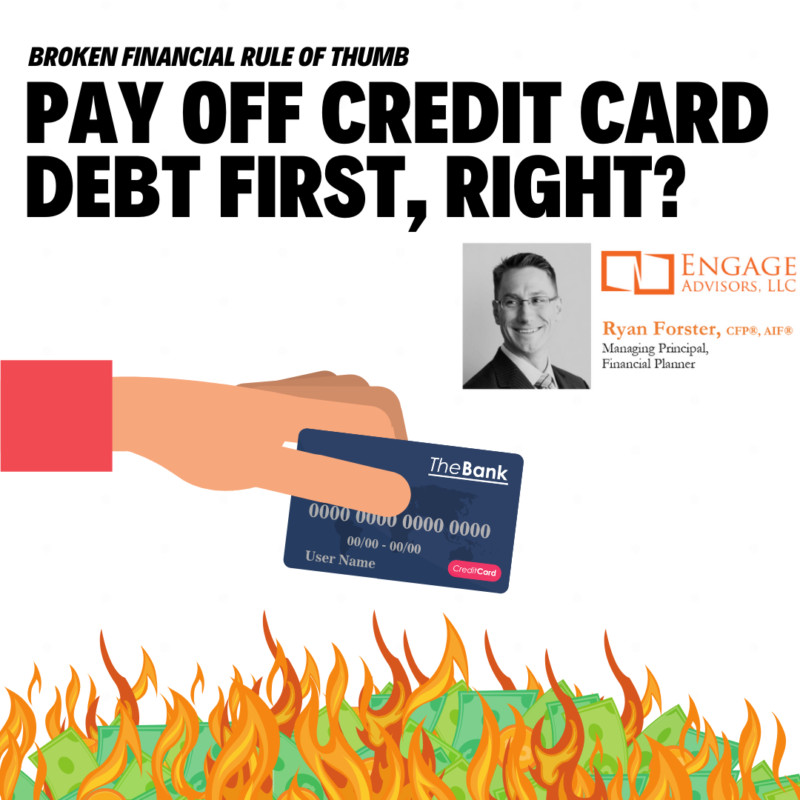“It isn’t the mountains ahead to climb that wear you out; it’s the pebble in your shoe.” – Mohammad Ali
Which Credit Card Should I Pay Off First
Rule of Thumb: You should pay off high-interest rate credit cards first.
Finally! A rule of thumb I could get behind for basically anyone who has a credit card! Well almost. We love debt when properly managed. It can help leverage wealth and income to create more and do more. When properly managed. Since the focus here is credit cards, we’ll spend most of our time there.
You’re not going to beat credit card’s interest with investment returns. With tax deferral, maybe for the first year… So yes, high-interest rate credit cards are your enemy, they have a thirst for your cash that rivals the IRS.
But what about 0% interest rate credit cards? Here’s where the rule breaks because 0% is never truly 0%… Let’s explore the two main scenarios.
Scenario 1: Big credit card balances and a 0% deferral period ending soon. Did you know most 0% financing is all or nothing? Pay it all off or pay interest on the entire balance the entire deferral period. Years ago, I bought a leather couch for $12,000 at 0% financing for 60 months. A good purchase that has lasted through dogs, toddlers and moving. Month 59, I had $200 due and accrued interest of $7,075.80. A day late and my $12k couch would have cost me $19k. Thankfully I paid it in time.
Scenario 2: Massive balance at 0% and much less on cards currently charging interest. Equipment, car, whatever you fancy at 0% financing. You could hack at smaller balances and stick to this rule. Then you may realize you’re that much closer to needing to pay off the big balance at 0% and have made no progress. Just take my above example and multiply that a couple of times. It’s important to manage larger balances so they don’t creep up on you. Bigger balances mean bigger balloons at the end. Not to mention, once the balance is accruing interest, the whole balance, including the new interest is accruing interest.
0% financing robs from tomorrow by baiting you with shiny objects today. At least that’s why it exists, as bait to buy now what you can wait for. The trap is with repeated use, you keep thinking you can get things for cheap and you can always make more money or earn more by investing. Its not just robbing you of your future income, but of your future compound investment return which is key to the work optional lifestyle.
You need to be investing the difference. Merely saying you can make more with your money doesn’t mean you’ll do anything with it. Most people just take out more debt and forget why they were attracted to 0% financing in the first place. Take back that compounding!
Fear of debt is because most fail at using it! If you don’t pay off debt or with low interest, don’t invest the difference you’re losing the game. Rather than intelligently arbitraging interest rates and tax savings, you have more debt, less cash, and monthly payments that choke off income, making future saving incredibly difficult.
The key to this rule is paying off debt that drags on your wealth first and investing where you build wealth the most effectively. That can be the difference between working until you’re 70 or having a work option lifestyle when you’re 55.
Too much debt service and constantly paying off interest is like running in the sand when it comes to growing your wealth.
Moral of the story – use debt tools at your own risk. There are some very healthy ways to leverage your income now and tomorrow, however, investing yesterday will always give you more spending money today than stealing income from tomorrow ever will.
If you want to know how to use debt effectively in your financial plan or want to learn how to pay off debt while accumulating wealth, please call Ryan Forster at 913.681.9155 or email ryan@engageadvisors.com.
**Engage Advisors, LLC is a Registered Investment Adviser. This platform is solely for informational purposes. Advisory services are only offered to clients or prospective clients where Engage Advisors, LLC and its representatives are properly licensed or exempt from licensure. Past performance is no guarantee of future returns. Investing involves risk and possible loss of principal capital. No advice may be rendered by Engage Advisors, LLC unless a client service agreement is in place.

